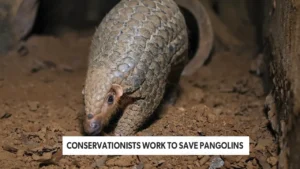
Conservationists Work to Save Pangolins
min read
TRANSCRIPT:
Alex Salvi (Correspondent, EarthxNews): The pangolin is a creature unlike any other: an insect eating animal that looks like a reptile but is actually a mammal. Its skin is considered a delicacy in some cultures; its scales, used in many traditional medicines—all contributing to the dwindling population. Residents in Kenya are trying to prevent that.
Beryl Makori (The Pangolin Project): We are estimating that we have between 30 to 80 giant ground pangolin left in Kenya—and that all is in this area we call Nyakweri because this is the only place we’ve confirmed they are.
Salvi: The pangolins are often the targets of poachers and traffickers, but also find themselves victims of climate change and everyday human activity. They’re protected under international law with most of the species considered to be critically endangered, prompting many communities in Kenya to take dramatic action to protect those remaining. Their first plan of action? Taking punitive steps against violators and making sure they learn their lesson to prevent any future harm.
Bernard Agwanda (The National Museum of Kenya): We’ve been able to sacrifice one pangolin to understand how the scales lose their weight. And so that when they’re at the airport and you are found with a suitcase—or a bag—of Pangolin scales, you can be able to determine how many pangolins are in that bag of yours—how many Pangolins did you kill, remove the scales, and are trying to to sell or export.
Salvi: Conventional conservation efforts are proving to be unsuccessful. Researchers hope, however, that new programs dedicating 10 acres to each animal could offer a renewed sense of hope for survival. But such an effort requires the collaboration of non-governmental organizations (NGOs) and individual land owners to make it work. Conservationists believe the most important step to ensuring the survival of pangolins is through educating people about their plight and believe that as residents become familiar with the species, they’ll be more willing to take on a bigger role to fight for their existence.
